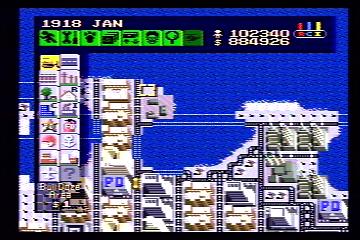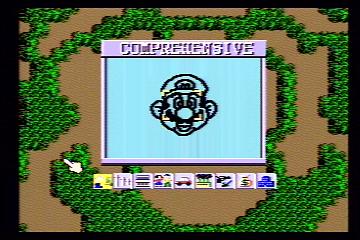



You have three types of main buildings that you have to manage: Residential, Commercial and Industrial. The descriptions and details of these buildings should be fairly apparent. Beyond that, you also have to place police and fire to maintain protection, seaports and airports to provide additional transportation, a sports stadium for entertainment, and power plants to provide power. Those are your main buildings (and there's also park space you can place). Beyond that, as you build, you'll occasionally get an assortment of gifts. That is, if you place a bunch of residential zones, you might get a school or a library. A bunch of trains can lead to a train station for additional travel. These gifts come as you progress through the game, and you can place them to make people happy.
That's the basics of what you have at your disposal to place. That isn't to say the game is without its management aspects though. Industrial zones give off pollution, and placing them close to residential zones can cause problems. You have two choices of power plants: coal or nuclear. Coal produces more pollution, but is cheaper. Meanwhile, nuclear is cleaner, but is more expensive, and also can have an unpleasant melt-down, which isn't the best thing to have going on in your city. While you might be tempted to cram every inch full of buildings, your citizens appreciate a bit of park here and there to enjoy. These are all things you will have to take into consideration as you plan your city. As well, as people move into your city, your population total will rise. When the number hits certain levels, your town will increase in what it's referred to: from town to city to capital, all the way up to a megalopolis. You can get a few gifts and you progress up in size, but, the real added advantage is that your mayor's house, which you place on the map near the start, increases in size as you progress. It's always fun to have a nice place to live.
The game offers you various charts and graphs where you can keep track of various aspects of your city. You can see areas which are causing pollution, areas with low crime protection, traffic congestion, and various other things to help you manage your city. While it's nothing too involved compared to later games, it's nice to have a bit of a look in on how things are going for your people, and what their needs are. The game also offers you a feedback rating on how your citizens feel you're doing as mayor. While they won't fire you or anything, people aren't as likely to move to a town where everyone feels the mayor is doing a lousy job. As well, you also have an adviser, "Dr. Wright" (Hi Will!), who will give you advice on various matters, and who you can go to for help when you're feeling lost. There's also another thing to take into consideration, which is the land you have to build your city on. SimCity comes complete with a large variety of different landscapes, 1000 in total. These all contain a different mix of land and water, with different arrangements and setups. You'll have to find one that suits the type of town you want to build best, and plan around the landscape that you're given. While one of the gifts you can earn allows you to clear a bit of land out of water, and things like power lines and roads can go over water, you'll have to plan your building around the water interspersed in between.
All of this is just details on the main mode, however. There's another mode to discuss, which is the Scenario mode. Here, you're presented with a specific problem, with a bit of description behind it. These problems can range from something like an earthquake or a serious crime problem, to a monster or alien attack. You're given certain goals that you have to meet, and a time frame within which you must do it. So, you must deal with the problems that the city has or has happening to it, rebuild and repair, and then help the city grow and thrive. At the end, if the citizens feel you've done a good job at solving their problems, you win the scenario. Aside from the challenge, the real reason to complete the variety of scenario modes is, if you complete all of them, you'll unlock a new land which you can use to build your town on, which will be quite to your liking.
That, really, is SimCity in a nutshell. What it comes down to, after all of that description is, it's your job to build a town and keep people happy. While it doesn't have as much management detail as later games, this isn't necessarily a bad thing, as it gives you more time to focus on placing your buildings and watching your town grow. Needless to say, this isn't the type of game that's going to appeal to everyone. It's low on action (aside from the random monster attack), and high on planning and watching your plans come to fruition. It takes time, patience, and caring for your citizens. If you have what it takes to make it as a mayor, step up and take hold of the job. Your citizens will thank you.
Gameplay: 10/10
Graphics/Sound: 7/10
Length/Replay: 10/10
Overall: 10/10